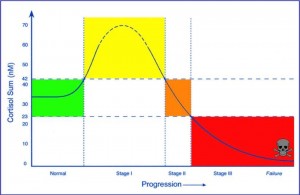In Part One, I introduced the concept that chronic stress and therefore adrenal fatigue can affect your ability to reduce body fat levels. In this post, I will further explain what adrenal fatigue is.
There are three stages of Adrenal Fatigue.
 Stage one is the initial response to stress where the adrenal glands secrete a higher amount of cortisol (stress hormone) than normal. However, when the stress is continuous, the sympathetic nervous system remains dominant and the cortisol levels remain high instead of falling back to normal levels. Now, people often feel good in stage one and rarely realize that there’s a problem.
Stage one is the initial response to stress where the adrenal glands secrete a higher amount of cortisol (stress hormone) than normal. However, when the stress is continuous, the sympathetic nervous system remains dominant and the cortisol levels remain high instead of falling back to normal levels. Now, people often feel good in stage one and rarely realize that there’s a problem.
Stage two adrenal fatigue occurs when the stress continues, but the adrenal glands become tired and aren’t able to secrete high levels of cortisol, even though the body is under stress.
Let me put it this way. Imagine you went for a long-distance run. You would start off at a certain pace, but there would come a point eventually, if you kept running where you would start to slow down due to tiredness. This is what happens to your adrenal glands. There comes a point when you can’t keep your pace up when running and a point when the adrenal glands can’t keep secreting cortisol.
A person may or may not begin to feel symptoms in stage two.
Symptoms of adrenal fatigue are numerous and vary from person to person. Some symptoms include:
*  Difficulty dragging yourself out of bed in the morning
Difficulty dragging yourself out of bed in the morning
* Lethargy
* Generally feeling run-down
* Muscular weakness
* Excessive muscle soreness
* Lack of libido
* Sugar cravings
* Increased PMS symptoms and
* Menopausal symptoms
The list is almost endless.
Stage three adrenal fatigue occurs when the stress continues further and the adrenal glands are so tired, that even though the body is under stress, the adrenals can only secrete very low levels of cortisol (lower than normal levels). People with stage three adrenal fatigue are likely to have symptoms and may be self-medicating or seeking professional help.
Adrenal fatigue is caused by too much stress or the inability to cope with normal stress.
Stress comes in many forms and can be caused by:
* Chemical
* Electromagnetic
* Mental/emotional
* Nutritional
* Thermic.
Physical stresses include physical trauma, poor posture, a sedentary lifestyle, too much exercise (or physical work), a lack of rest and/or sleep or going to bed too late at night.
Chemical stresses include pesticides, food additives, cigarette smoke, alcohol, mercury fillings, polluted air, common toiletries, cosmetics and perfumes, new carpets and paints and the chemicals in tap water to name just a few.
Electromagnetic stresses include over-exposure to sunlight, mobile phones, wi-fi, computers and microwave ovens.
 Common mental/emotional stresses include financial stress, unhealthy relationships, arguments, unrealistic workloads and deadlines and not being clear on your life’s goals.
Common mental/emotional stresses include financial stress, unhealthy relationships, arguments, unrealistic workloads and deadlines and not being clear on your life’s goals.
Nutritional stresses include over-eating, under-eating, eating the wrong macronutrient ratios for you type, poor quality foods and eating foods that you’re sensitive to.
Thermic stresses include anything that might burn you or anything that may lower your body temperature for too long.
Stay tuned for Part 3 when I will explain how Adrenal Fatigue affects fat loss…

